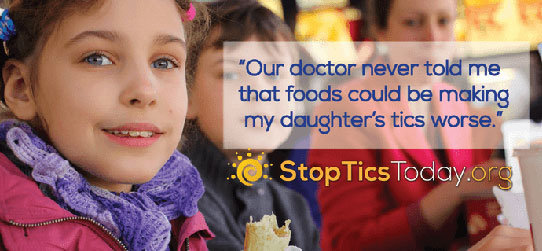|
|
Stop Tics Today |
|
Did you know that millions more people deal with tics today than just two decades ago? It's an epidemic that has largely been ignored. Tics can be disruptive, distressing, embarrassing, and painful. Children are most affected, but adults suffer from them also. Once rare, Tourette syndrome is now estimated to affect 1 in 100, while even more people live with persistent or temporary tics. Lyme disease and Pediatric Acute Acute-onset Neuropsychiatric Syndrome (PANS or PANDAS), among other conditions, can also include tic symptoms. So says a new organisation, StopTicsToday, brainchild of the excellent Association for Comprehensive Neurotherapy, which wants to raise money for research into, and support for, the rapidly growing numbers of both children and adults who suffer from tics. Medications prescribed to subdue tics often have troublesome, strong side-effects or are simply ineffective. But dietary intervention, although rarely considered by the conventional medical profession, can be very effective. To quote from the StopTics Today site: Why wasn't the mother in this photo (above) told that foods (or drinks!) might be triggering tics in her child? Because her doctor didn't know. In fact, some physicians even tell parents that it is "impossible" that tics are related to diet. Well, they're dead wrong. Just because popular organizations like the Tourette Syndrome Association have failed to pursue a link between diet and tics doesn't mean the link does not exist. In fact, the connection between foods and tics has been reported by integrative doctors, adults with tics, and observant parents for decades, as well as in limited research. But no one has focused on collecting information on the link between diet and tics and informing the public, except us. Our organization, ACN Latitudes, has been spreading our findings on the important diet and tic connection, including Tourette syndrome, for 20 years! But what we need now are studies. Where traditional research on tics has missed the boat It's common knowledge that diet plays an important role in high blood pressure, migraines, heart disease, diabetes, hives, depression, asthma, allergies, hyperactivity, and a long list of other conditions. So, what about the role of diet in Tourette syndrome and other tic disorders? To date, mainstream medicine has spent millions of dollars trying to discover causes and treatments for tics. Unfortunately, the results have been dismal. The causes have not been identified and the treatments are often ineffective and dangerous. With standard treatment, patients as young as four years of age are offered strong drugs to control tics, yet families are not even aware of the possible role of diet and the environment in the child's tics. In severe cases, electrodes are even placed in the brain while other possible avenues such as controlling for allergies, chemical exposures, and any dietary factors have not been considered. What observant doctors and families tell us When someone has a food allergy, sensitivity or intolerance, and they eat the offending foods, tics can be triggered or aggravated. Whether there will be a reaction, and what items may cause the reaction, differ with individuals. You can read the family reports shared on our website www.latitudes.org where parents or adults with tics share what they discovered about diet and tics. Check these reports out here. You will see that there is not a one-size-fits all diet that works for everyone to reduce tics. What bothers one person may not affect another. In fact, some people may not find a connection at all. But it is well worth the effort to explore this area. Finding new answers through research on diet and tic disorders Foods can play a key role in tics or they may simply be one of several aggravating factors for a person. For some people, the answer to their tics is right in their kitchen. We would love to have your story with insights you've found on diet and tics. Contact page. Please join the fight by funding research on the diet and tic connection. Donate here. So new answers are needed – more effective approaches and safer treatments than conventional medicine offers. To learn more about tics, Tourettes and how you may be able to stop them, go to
November 2014
|













